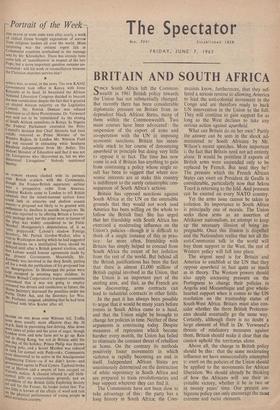- -Portrait of the Week THE DEATH OF POPE JOHN XXIII
after nearly a week of critical illness brought expressions of sorrow from religious leaders all over the world. More surprising was the evident regret felt in Communist countries symbolised in the message sent by Mr. Khrushchev. There has already been some talk of 'sanctification' in respect of the late Pope, but a more important question remains un- answered : will his work of reconciliation between the Christian churches survive him?
AFRICA was, as usual, in the news. The new KANU Government took office in Kenya with Jomo Kenyatta at its head. In Swaziland the African National Liberation Congress decided to boycott the new constitution despite the fact that it granted an elected African majority on the Legislative Council. Mr. Patrick Duncan was refused admission to all three Protectorates. Dr. Verwoerd was said not to be 'intimidated' by the closing of South African consulates in Kenya. In Nigeria the Federal Parliament overruled the Privy Council's decision that Chief Akintola had been validly removed as Prime Minister of the Western Region. In London Mr. Winston Field did not succeed in extracting white Southern Rhodesia independence from Mr. Butler. The Malawi Minister of Education said that it was not Dr. Livingstone who 'discovered us, but we who discovered Livingstone.' Nobody mentioned Stanley.
IN EUROPE FRANCE clashed with its partners over British ccntacts with the Community, though the Franco-British supersonic airliner won a prospective order from America. Admiral Ricketts came to London to tell British admirals that the mixed-manned surface force could lurk in estuaries and shallow coastal waters—a proposal not likely to be greeted with enthusiasm by dwellers in seaside bungalows. Hp was also reported to be offering Britain a favour- able Package deal, but the point most in favour of the plan was widely considered to be Field- Marshal Montgomery's denunciation of it as 'utter poppycock.' Labour's shadow Foreign Secretary, Mr. Patrick Gordon-Walker, after a visit to Washington during which he had suggested that decisions on a multilateral force should be delayed until after a British general election, said that Labour would honour agreements made by the present Government. Meanwhile, Mr. Kennedy was involved in the deep South, putting off for a week the publication of his proposed law ken 'desegregation' In Mississippi the police were i,t occupied in arresting negro children. In Britain Walsall Corporation's transport committee announced that it was not going to employ coloured bus drivers and conductors in future, the _Home Secretary increased the penalties under the 1:1•Iblic Order Act, and the Secretary for War, !YU% Profumo, resigned, admitting that he had been Involved with Miss Keeler after all.
*
EATtis
ON THE ROAD over Whitsun fell. Traffic I41113 were usually more effective than the 50 M.p.h. limit in preventing fast driving. Also down were cases of polio and the price of sugar, though London train and tube fares are to go up. Rain fell in Hong Kong, but not in Britain until the last day of the holiday. Prince Philip was thrown Playing polo, and a Soviet Marshal was reduced in rank for contact with Penkovsky. Communists were discovered to be active in the Amalgamated Engineering Union—as if we didn't know—and government agents in Plaid Cymru. Typhoid broke out at Harlow and a swarm of bees escaped on Victoria station. A chemist refused to sell birth- -Plltrol pills on conscientious grounds, and an exPedition of the British Girls Exploring Society set sail for the Faroes. Its leader stated that 'Far too little is known of the effects of wind and rain ell. the physical performance of young people in wild mountain country.'










































 Previous page
Previous page